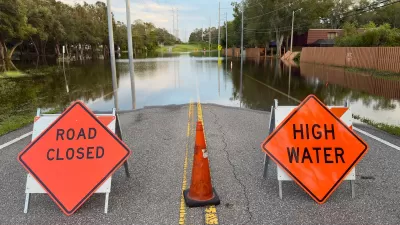As flooding, fires, and other disasters become more destructive, an effective response requires more resources than local governments can offer.

In an article for Governing, Donald F. Kettl argues that the federal government shouldn’t abandon disaster mitigation and relief to local governments and private insurers, as some have suggested.
“Virtually every part of the country is seeing more and larger emergency events, on a truly historic scale,” Kettl writes, with two major implications: first, local governments and even state governments don’t have the capacity and resources to respond to disasters as quickly as FEMA.
“Second, more mandates have followed federal aid. The feds are now requiring everyone who has had property damaged in a flood disaster within a high-risk flood area to buy insurance, either from a private company or from the federal National Flood Insurance Program.” FEMA also started a voluntary “severe repetitive loss” program that allows state and local governments to buy out properties that suffer repeated damage.
For Kettl, the federal government’s growing role in disaster management is inevitable.
FULL STORY: Why Washington Can't Get Out of the Disaster Relief Business

Planetizen Federal Action Tracker
A weekly monitor of how Trump’s orders and actions are impacting planners and planning in America.

DARTSpace Platform Streamlines Dallas TOD Application Process
The Dallas transit agency hopes a shorter permitting timeline will boost transit-oriented development around rail stations.

Four Reasons Urban Planners Can’t Ignore AI
It’s no longer a question of whether AI will shape planning, but how. That how is up to us.

Amtrak’s Borealis Exceeds First Year Ridership Expectations
205,800 passengers have boarded the St. Paul to Chicago line, well above initial MDOT projections.

Study: 4% of Truckers Lack a Valid Commercial License
Over 56% of inspected trucks had other violations.

Chicago Judge Orders Thousands of Accessible Ped Signals
Only 3% of the city's crossing signals are currently accessible to blind pedestrians.
Urban Design for Planners 1: Software Tools
This six-course series explores essential urban design concepts using open source software and equips planners with the tools they need to participate fully in the urban design process.
Planning for Universal Design
Learn the tools for implementing Universal Design in planning regulations.
City of Mt Shasta
City of Camden Redevelopment Agency
City of Astoria
Transportation Research & Education Center (TREC) at Portland State University
US High Speed Rail Association
City of Camden Redevelopment Agency
Municipality of Princeton (NJ)





























